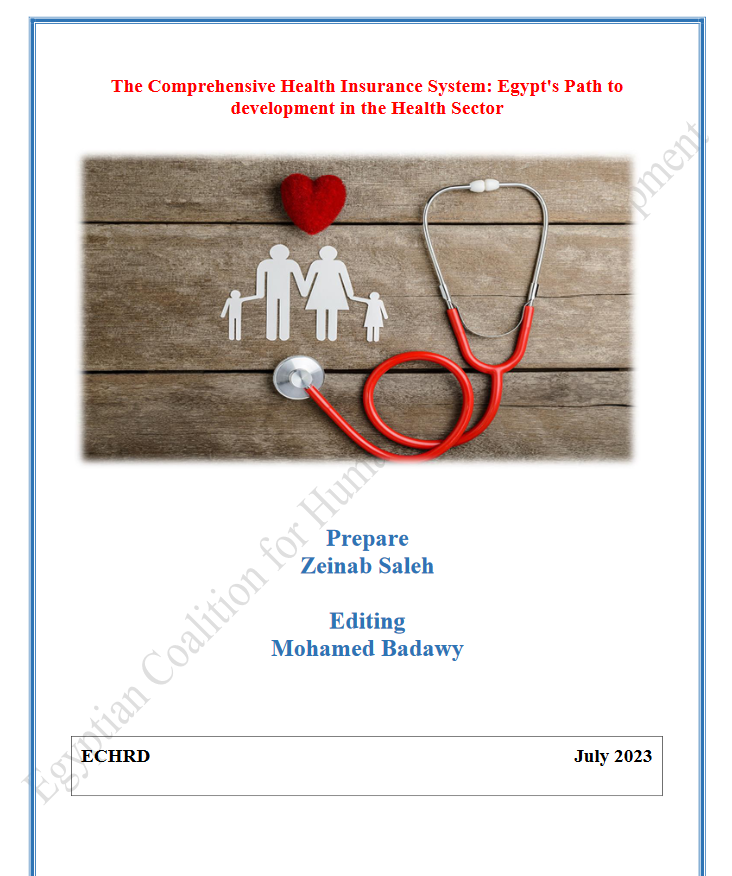Press Release
………………………………………………………………..
Today, Tuesday, 11/7/2023, the Egyptian Coalition for Human Rights and Development issues its report “The Comprehensive Health Insurance System: Egypt’s Road to Development in the Health Sector”, which deals with the “Comprehensive Health Insurance Law and its Executive Regulations”, which is the result of continuous work involving experts, government officials and civil society. Numerous hearings have been held with the aim of designing a comprehensive insurance system that achieves availability, accessibility, acceptability, and quality of health services and protection provided without discrimination and regardless of income level, with the aim of ensuring a governing and comprehensive legal framework for the health system that represents a comprehensive plan that will fully and sustainably advance this obsolete system.
Therefore, the report addresses all topic related to comprehensive health insurance system and its impacts on developing the health sector, especially at the Egyptian level, through some axes, which are:
- Challenges facing the health sector in Egypt.
- Definition of comprehensive health insurance system.
- Origin, philosophy and principles of the comprehensive health insurance system.
- Steps of the phased application of the system.
- Advantages, objectives, and importance of the comprehensive health insurance system.
- Health services the comprehensive health insurance system provides.
- Levels of health care according to the comprehensive health insurance system.
- Digital services of the system.
- Stages of implementing the comprehensive health insurance system.
- Interest of international conventions in the right to health.
- Recommendations.
From the repeated experiences of health reform in Egypt, and in other countries, it is clear that the health reform process is a difficult process, but an evaluation system must be built within the reform experiences, so that mistakes are learned. Service insurance providers need incentives to write data reports accurately.
It is necessary to collect, analyze and disseminate data and realize that the new system will show its results in the medium and long term, with the condition of parliamentary oversight and community participation on performance.
Because of the importance and difficulty of establishing a new system with new bodies from the heart of an old system requires a time of stability and full functioning. The law has set the rules and procedures governing the gradual application of its provisions, so that the transitional phase of the old system of the new system is managed in a balanced manner and the law will be applied gradually in several stages up to ten years to ensure the quality of implementation. Of course, gradualism in the application in several stages gives the decision-maker a good opportunity to learn from mistakes, and then avoid them.
Challenges facing the health sector in Egypt:
Problems of developing health resources: – Problems of resource organization: – Problems of health care delivery: – Problems of economic and financial support: – Health accounts – Health system management problems:
The new Comprehensive Health Insurance System aims to cover all citizens at all stages of their lives. The state guarantees financial protection for those who are unable to afford it, and this system provides protection from the financial burdens of families and citizens, and the basic principle of the law is solidarity and partnership between the different segments of society and the state.
The law represents an integrated framework for reforming the health system in a comprehensive manner and not only a law to provide health service to citizens, and addresses the disadvantages of the current health system, as well as being a huge qualitative leap and ambition to reform the health system as a legislative tool.
There are six stages of implementing the comprehensive health insurance system in all governorates of the Arab Republic of Egypt, so that the last station for the application of the system will be in the governorates of Cairo, Giza and Qalyubia.
The first phase started in Port Said Governorate, as a trial run in July 2019.
According to the executive regulations of the law, it is applied in 6 stages within 15 years.
Recommendations:
- Establishing an administrative unit or assigning a committee to follow up on the hospital’s adoption of the dimensions of the quality of health services and determine the extent of response to them continuously in order to identify and address weaknesses in order to improve the quality of health services provided to beneficiaries and to provide all basic examinations in all health units.
- Directing research at the postgraduate and promotion levels in universities and various research centers to health awareness, with an interest in contributing to conducting research in remote environments and areas that lack basic services.
- Civil society organizations to achieve health awareness, through activating community participation, which includes the government, civil society and the private sector.
- Setting high-quality standards for the accreditation of insurance companies and hospitals involved in providing comprehensive health insurance system services to ensure the provision of high-quality health care services.
- Activating the role of the media in achieving health awareness, intensifying health programs, and conducting an enlightenment course on the benefits of health insurance.
- Complete the shortage of equipment and continuous maintenance to avoid breakdowns, and increase the number of doctors and staff to avoid congestion.
- Benefiting from the contributions of the comprehensive health insurance system, which will reflect positively on the level of services provided.
- Introducing measures that show the extent to which the performance of the comprehensive health insurance system meets the needs of community members.
- The need to develop uniform standards for the practice and management of health services to achieve justice among beneficiaries.
- Attention to securing hospitals, and constantly improving waiting areas.
- Computerization of procedures carried out in all health insurance operations.
- Providing all medicines in the pharmacy and developing an organized policy for that.
- The need for optimal use of the patient’s card.








